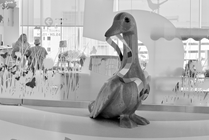Search Results
Viewing: 611-620 of 1469 | All
Article
Angiogram
Learn more about an angiogram, also called an arteriogram, which is a test that is done to study the size and shape of your child's blood vessels.

Condition
Psoriasis
Psoriasis (sore-EYE-uh-sis) is a common skin problem that looks like pink or red areas of skin topped with white or silvery scaly patches.
Article
Rapid Genome Sequencing
Your child’s doctor has recommended a genetic test called rapid genome sequencing (rGS). This test looks for changes in DNA that could cause or contribute to a medical condition. About Your Genetics Our bodies are made up of billions of building blocks called cells. Each cell contains DNA.

Condition
Diarrhea
Diarrhea (loose, watery bowel movements) is a common problem in young children. It is usually caused by a virus. It can also be caused by bacteria, something that the child eats or drinks (like too much fruit juice) or starting a new medicine. It rarely means a child has a serious illness.
Article
Circulation Checks
Your child has received a treatment that can affect blood flow (circulation) in the injured arm or leg. You will need to check the circulation in your child’s fingers or toes.

Condition
Femoral Anteversion
Femoral anteversion is an inward turn of the thigh bone, which can cause the knees and toes to point in.
Increased Intracranial Pressure
Increased intracranial pressure (ICP) means greater than normal pressure on the brain. It results from a greater volume of fluid or swelling of the brain. Call 911 if your child loses consciousness or has convulsions (seizures) lasting longer than 5 minutes.

Condition
Sports Medicine: Ankle Dislocation or Subluxation
The ankle joint is made up of two lower leg bones and a foot bone. A dislocation is an injury to a joint causing the bones to no longer meet together correctly. In the ankle, this can occur when the talus no longer is in position with the tibia and fibula. A subluxation is a partial dislocation.
Article
IV: Implanted Port
The implanted port is a device that is placed under the skin. It lessens the need to start an IV for every treatment.

Condition
Allergy to Dust Mites
This Helping Hand™ covers allergy to dust mites. When a person who is sensitive to the dust mite breathes in these particles, they can cause sneezing, coughing, runny nose, congestion and itchy, watery eyes.
